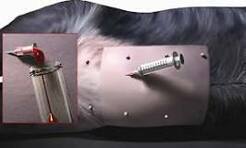 ABDOMINOCENTESIS FLUID DRAINING
ABDOMINOCENTESIS FLUID DRAINING
Abdominocentesis:
This is a "generally a safe procedure that can be performed in most canines without the need of sedation. This procedure is a successful way of removing excess fluids from the abdominal cavity, aiding the dog's ability to breathe and eliminating pain."
Source: https://wagwalking.com/treatment/abdominocentesis
Meeko did well with this procedure and is currently having it done once a week. We call this his 'spa day' since he comes home with a nice slim tummy again afterward (and because he gets lots of nice attention from the nurses at the vet!).
Precautions:
There are precautions for this procedure, but Meeko has not had too much trouble with the protein or 'albumin' loss. We have also been giving him a High Protein diet and lots of fluids to help him with that issue.
Having to do the weekly abdominocentesis is not ideal, and we hope to eventually lessen the time between treatments. In the meantime, he is still taking a diuretic as well as other supplements to help with cardiac function and to alleviate excess fluid buildup.
Other Options:
We also try to walk him often (or go outside in the yard) for light exercise to help with circulation and to make sure he's eliminating excess fluids as well as having good bowel movements since this can also contribute to bloat.
Some herbal and homeopathic treatments that we also used in conjunction to the meds from the Vet for fluid buildup included Urinary Gold (for the Kidneys) and Dandelion Root (for the Liver).
Dietary:
Another important Herbal Tonic that we used was Young At Heart which can be mixed into their food or given orally. We also followed the guidelines for a low sodium diet by making mostly homemade meals for Meeko.
That way we could know what was going into it, as well as control the quality. We used all-organic ingredients such as Brown Rice, Carrots, Parsley (also a natural diuretic!), and grass-fed beef, chicken and organ meats.
Treatment for Fluid in Abdomen of Dogs
Treatment for ascites varies according to the underlying condition. The fluid can be removed via abdominocentesis, but this is only a temporary solution, as fluid can build up again if the cause of the ascites is not addressed.
Unless your dog is having difficulty breathing because of the amount of fluid in the abdomen, the veterinarian most likely will not recommend this procedure.
Your dog will lose albumins along with the fluid, and decreasing pressure in the abdomen may lead to an increase in the fluid buildup.
Instead, a diuretic to increase the loss of water through urine, combined with a low sodium diet, is more often used to manage ascites.
During this time, the condition causing ascites will also need to be treated, with treatment ranging from special diets for dogs with liver disease to drug therapy to improve cardiac function.
Read more at: https://wagwalking.com/condition/fluid-in-abdomen#
(SEE: Pt.1, Pt.2, Pt.3, Pt.4, Pt.5, Pt.6, Pt.7, Pt.8, Pt.9, Pt.10)
*Please consult your veterinarian before making any changes to your dog's supplement, diet, or exercise habits.
 RSS Feed
RSS Feed